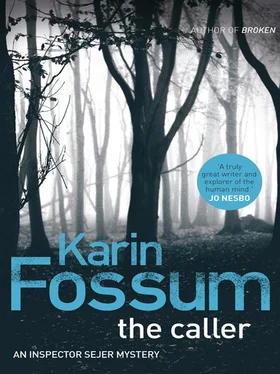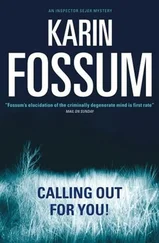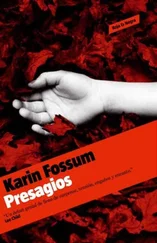Sejer sat by a lamp reading about ALS. Helge Landmark had come down with it just six months earlier. Developing very quickly, in the course of a short time it would lead to his death. ‘Amyotrophic lateral sclerosis is a disease of the central nervous system that attacks nerve cells in the spinal cord and brain. The disease is incurable and treatment is exclusively symptomatic. Because they lose strength in their breathing apparatus, ALS patients die of weakened lungs. For some, the first symptoms are difficulties with speech and swallowing. Or the disease begins asymmetrically, frequently with a weakness or clumsiness in one hand.’
Finally he noted the name of some famous ALS patients: Mao Zedong. Stephen Hawking. Axel Jensen.
He was suddenly filled with fear — it leapt on him from behind. Could he describe his passing dizzy spells and his subsequent loss of balance as asymmetric symptoms? The thought was so overwhelming that he gasped for air. To shove the ridiculous idea away, he picked up a sheet of paper that was lying next to the telephone. He’d made a few notes on it. He had called Gunilla Mørk, and they had talked about everything — the most important being the Polish student who had stood on her steps asking for work. She had tried, as best she could, to remember how he’d looked. But she admitted that she hadn’t been herself, that she hadn’t been able to retain any significant details on account of the obituary, which she had just read and which had shaken her to the core. After that Sejer had talked with Sverre Skarning’s young wife. From her he’d obtained a very good description of the man who had come to buy a tray of eggs. Or rather a boy. He had also ridden a moped, or a small motorcycle, she couldn’t tell the difference. They had conversed for a while. He had a friendly voice, she said, rather light and pleasant, and seemed sympathetic. Finally he had spoken with Lily Sundelin. She had remembered something from the hospital. A young man with his arm in a cast had walked up and down the hallway, and he had stared at them without inhibition. Putting it all together, he now had a picture of the person he thought was terrorising people: a young, slender man or boy between the ages of eighteen and twenty-five, with longish hair and dark eyes. Dressed in jeans and trainers. And he zoomed off on a moped, or perhaps a small motorcycle, which in all probability was red. The same colour as the helmet. He had a friendly, thoughtful demeanour that won people over. That’s why they trusted him. Asymmetric symptoms, he thought, and put his head in his hands. The damn dizziness. As if someone rapped his knees so that his legs would buckle. No, it had nothing to do with paralysis, he thought, it’s in my head — if that’s any better. He tried to find a kind of peace as he sat in the waning light, but it was taken from him. He leaned his head against the back of his chair and closed his eyes. Hell begins now. It’s probably old age coming to claim me, making me think about death. It’s what the person who’s playing this awful game wants. My heart has pumped hard for many years, and now it’s starting to count down.
I have a certain number of beats left. That’s just the way it is.
And God knows what he’ll do next time.
The Central Hospital was a square, thirteen-storey building. It had been constructed in ’64, and two wings had since been added on. If you walked through the main entrance, you came first to an information desk, a wide, curving counter made of light wood. Next to the information desk were several small couches, upholstered in blue fabric. Here you could sit and wait if you had accompanied someone for an examination or a treatment. There was also a large cafeteria, and a kiosk with a little florist’s shop which sold ready-made bouquets. There was a pharmacy in one corner. The high ceiling had a dazzling array of tiny light bulbs which made everything gleam. There were always people milling around by the information desk. A thrum of voices, the clinking of coffee cups and glasses, and the endless sound of lifts coming and going. Now and then a telephone would ring. There was also the sound of the double glass doors, which swooshed as they opened and closed. Altogether, four people staffed the information desk, and they worked in shifts. Today it was one of the oldest of the crew, Solveig Grøner, helping people find their way. For a long time she had sat absorbed in a stack of papers, until something caught her attention and forced her to look up — the swoosh of the double glass doors. A woman rushed in. She seemed exhausted, as if she’d run the whole way from the car park. Solveig Grøner let go of the stack of papers. The woman was perhaps forty. Her thick, dark hair gathered at the neck. Even wearing high heels, she reached the desk in record time.
‘Evelyn Mold,’ she said, gasping for breath.
She pronounced the name ‘Evelyn Mold’ with a kind of expectation. As if a number of things would instantly occur, and Solveig Grøner would immediately understand. People would come rushing, bells would ring. But nothing happened. She plonked her hands on the desk, pale against the light wood, and tipped over a box of paper clips. But she seemed to take no notice. She just stood there waiting.
‘Evelyn Mold,’ she repeated, a little louder now.
Solveig Grøner remained calm. During her many years at the hospital she had seen just about everything; besides, it was vital that she make no mistakes. Not here, in this building full of sickness and death. ‘Mold?’ she asked pleasantly. ‘Is that someone you’d like to visit?’
The woman nodded. She put a hand to her throat. Her cheeks were no longer red; she was beginning to turn pale. ‘It’s me,’ she panted. ‘I’m Evelyn Mold.’
Solveig Grøner didn’t understand what the woman wanted. Because she noticed someone on the blue couches in the waiting area watching them, she leaned forward and lowered her voice. Discretion was important. She was never careless about it.
‘How may I help you?’
‘You called. You rang and asked me to come! Now here I am. So help me! Help me!’
Solveig Grøner could feel the woman’s nervousness beginning to rub off on her. One thing at a time, she thought. Be careful. Do this right. Name. Procedures. ‘Is there someone you wish to visit?’
The woman was trying not to become hysterical, but she was losing her patience and growing bellicose. She didn’t understand why no one was here to meet her. They should have rushed to her. They should have been in the doorway. ‘Frances,’ she said. ‘My daughter. Frances Mold. She rides a scooter.’
Solveig Grøner nodded. Scooter, she thought. ‘Who told you to report to the hospital?’
‘The hospital.’
‘Here? The hospital?’
Evelyn Mold was now so distraught that she lost her voice.
‘Was she in a traffic accident?’
Evelyn Mold began to cry. Her hair, held loosely together, spilled over her cheeks. ‘They said it was serious,’ she managed. ‘I drove as fast as I could. Can you get somebody? Can you tell me where to go? You’ve got to hurry. They said it was serious!’
Solveig Grøner lifted the handset and dialled a number. She felt very uncertain. This wasn’t the hospital’s routine.
Evelyn Mold waited. She saw everything as if through a weak shaft of light. She also heard the rising and falling hum of voices, the clinks of cups and glasses from the cafeteria and the sudden, sharp snapping of a newspaper. Exactly the sound you make when you want to emphasise something important you’ve just said. Then she heard Solveig Grøner’s voice.
‘Frances Mold … Yes … Traffic accident … Her mother has arrived … No, it’s a teenager … What? What did you say?’
Читать дальше












